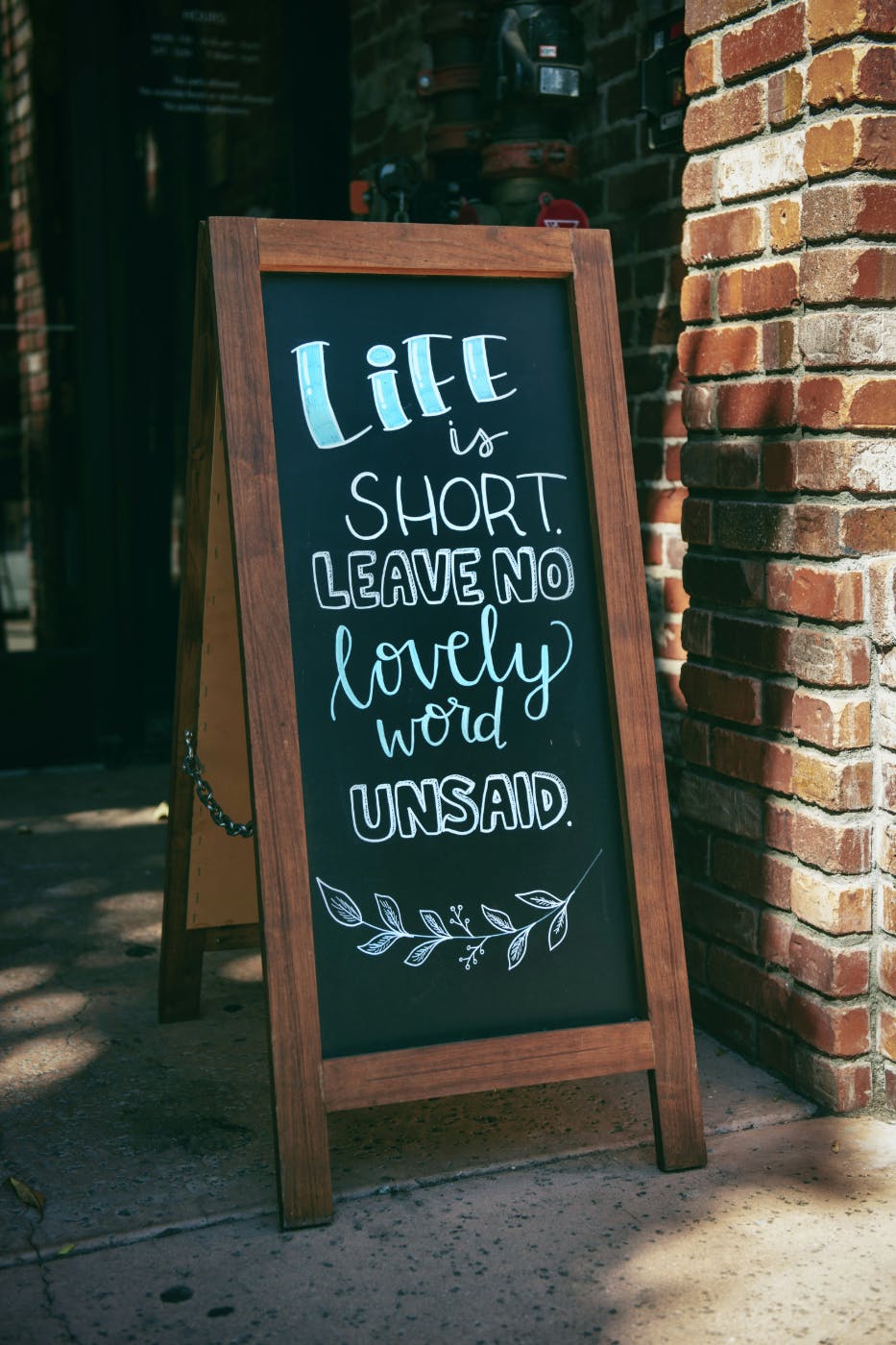
Yes, the very building blocks of words were called actions. Think about that. Letters waiting to be formed into words weren’t passive. They weren’t just sitting there as meaningless shapes. They were waiting to do something.
We've all seen the bit. Someone gets so angry they can’t even form words—they’re just making noises, clenching their fists, maybe throwing punches. And then someone nearby says, "Use your words."
But not everyone really uses words. Some just let them slop out of their open maw, dribbling off their lips like lukewarm soup. Others wield them—like sledgehammers, like scalpels, like guns. Words can be tools of power, precision, and persuasion. They can be used to rile up a crowd or calm it, to divide people or bring them together, to educate or manipulate.
Words, when used right, are active and direct. They don’t meander. They strike. They land.
Here’s something to chew on: in the days of the printing press, individual letters were stored in compartments above the press, waiting to be aligned into words and printed. And what were those letters called?
Actions.
Yes, the very building blocks of words were called actions. Think about that. Letters waiting to be formed into words weren’t passive. They weren’t just sitting there as meaningless shapes. They were waiting to do something.
Words, then, are action. They are power in motion. They are tools that shape reality. And the way we use them—flippantly, destructively, or with purpose—matters more than we often realize.
Words That Changed the World
History is full of moments where words shaped the course of events. The Gettysburg Address wasn’t just a speech; it was a redefinition of a nation’s ideals, and it was only 272 words long. In less than three minutes, Abraham Lincoln reshaped the meaning of democracy and sacrifice.
Martin Luther King Jr.’s I Have a Dream speech didn’t just describe a vision; it moved mountains of resistance. Winston Churchill’s wartime speeches, such as We Shall Fight on the Beaches, were words that galvanized a nation to stand strong in its darkest hour. The Declaration of Independence was nothing but words on parchment—yet those words ignited a revolution.
More recently, a single tweet or a viral hashtag can ignite social movements, toppling leaders or pushing policies forward. "Me Too" and "Black Lives Matter" are just words—but they have shaken industries and institutions to their core. The power of words is even evident in modern conflicts and diplomacy, where a well-placed statement from a leader can either defuse tensions or escalate them.
But words don’t need to be grand to be powerful. A well-placed apology can mend a broken relationship. A thoughtful "I believe in you" can be the push someone needs to keep going. Even silence—knowing when not to speak—can be a strategic use of words.
The Science of Words
Words don’t just communicate ideas—they shape our brains. Neuroscientific research shows that words can physically alter our neural pathways. Positive words activate the brain’s reward centers, reducing stress and promoting well-being. Conversely, negative words, especially repeated over time, can reinforce anxiety and even trigger fight-or-flight responses.
Dr. Andrew Newberg and Mark Robert Waldman, in their book Words Can Change Your Brain, explain that a single negative word can increase the production of stress hormones and impair logic and reasoning. Meanwhile, words of affirmation help foster emotional resilience and cognitive clarity. This means our choice of words—whether self-talk or communication with others—literally rewires our minds.
But beyond emotional impact, language fundamentally shapes cognition—the way we perceive, categorize, and interact with the world. The Sapir-Whorf Hypothesis suggests that language influences thought processes, and different languages structure reality in unique ways.
Bilingualism provides further insight into how words shape thought. People who speak multiple languages often report feeling like different versions of themselves when switching between languages. This is because languages carry cultural frameworks, influencing emotional responses, decision-making, and even moral reasoning.
The way words construct time is another example. English speakers see time as linear, with the past behind and the future ahead. However, the Aymara people of South America conceptualize the past as in front of them (because they can see it) and the future as behind them (because it’s unknown). These differences in language alter how people plan, reminisce, and make decisions about the future.
Even the words we use for ourselves matter. Studies on self-talk reveal that referring to oneself in the third person during stressful situations ("You’ve got this" instead of "I’ve got this") can create psychological distance, improving emotional regulation and decision-making.
So when we say, "Use your words," we’re not just advocating for verbal communication. We’re shaping perception, influencing thought patterns, and literally rewiring the brain. The words we choose don’t just describe our reality—they create it.

The Weight of Promises and Declarations
Some words carry a unique gravity: vows, oaths, legal decrees. A single declaration—"I do," "You’re hired," "Not guilty"—can alter lives in an instant. Political treaties, business contracts, and even personal commitments all demonstrate the immense weight of language.
Why do we honor words in this way? Trust in language is foundational to human cooperation. If words lose meaning, societies crumble. The power of a promise rests not just in the speaker but in the collective belief that words shape reality.
In legal and political systems, words hold power because they create binding agreements. A judge’s ruling is just words, but it determines fate. A presidential oath is a verbal contract shaping governance. Religious vows, marriage commitments, and even casual promises between friends all rely on the expectation that words represent truth and intent.
Breaking a promise or oath has consequences beyond disappointment—it undermines trust in the power of language itself. When contracts are broken, when leaders fail to keep their word, when deception erodes belief in institutions, we see the fragility of language as a foundation for order.
But promises also have a flip side: they can be used to manipulate. Politicians make empty promises to gain support. Advertisers use persuasive wording to imply guarantees that don’t exist. Understanding the weight of words means recognizing when they’re being used sincerely versus when they’re being wielded as tools of control.
In the end, a promise is only as powerful as the intent behind it. Words alone don’t create change—people do. But without trust in words, the bridges we build between ourselves and others begin to collapse.
Censorship and the Power of Suppressed Words
What happens when words are silenced? Throughout history, governments, institutions, and even corporations have censored language to control narratives. From banned books to restricted speech, controlling words often means controlling power.
Yet, suppression often has the opposite effect—banned words and ideas tend to grow in strength. Literature that was once outlawed, like 1984 or To Kill a Mockingbird, became cultural milestones. The internet has also redefined censorship, as information once controlled by a few can now spread worldwide in seconds.
Censorship doesn’t only occur in authoritarian regimes—it happens in democracies, too. Social media platforms regulate speech, deciding what is acceptable and what is misinformation. Political correctness shapes public discourse, sometimes for the better, preventing harm, but sometimes leading to overcorrection where debate is stifled.
Historically, the suppression of language has been used to erase cultures. Colonizers often forbade indigenous languages, forcing assimilation. When a language dies, so does an entire way of thinking. The fight to preserve endangered languages isn’t just about words—it’s about identity and history.
On the other hand, some words are suppressed because of their ability to incite violence, hatred, or misinformation. Hate speech laws exist to prevent harm, but where is the line between protection and censorship? The debate continues, showing that words have real-world consequences.
Ultimately, the suppression of words raises a paradox: the more we try to silence an idea, the louder it often becomes. Words hold immense power—so much so that even trying to erase them gives them new life.
Cultural Differences in Language Power
Not all words carry the same weight across cultures. Some languages have words for emotions or experiences that don’t exist in others. For example, the Portuguese word saudade describes a deep, nostalgic longing, while the Japanese term wabi-sabi encapsulates the beauty of imperfection and transience. These words shape how cultures interpret emotion and meaning.
Some languages also require different levels of formality and hierarchy in communication. In Korean and Japanese, honorifics dictate how one speaks depending on social rank and familiarity. In contrast, English places less emphasis on hierarchical distinctions in everyday speech, affecting the way relationships are perceived and navigated.
Metaphors also vary significantly across cultures, revealing differences in thought. In English, we speak of time as money: we "spend time," "save time," and "waste time." But in many Indigenous cultures, time is seen as cyclical rather than linear. This changes how people relate to the past and future, shaping worldviews on destiny and planning.
Additionally, certain words carry different connotations across cultures. In Western cultures, directness is often valued as honesty, while in many Eastern cultures, indirectness is seen as a form of respect and diplomacy. What is considered persuasive, polite, or even offensive varies widely depending on linguistic norms.
Even the ability to read and write in a language alters cognitive function. Studies suggest that people who are literate in logographic languages like Chinese process visual information differently than those who use alphabetic scripts. The way language is structured influences perception at a fundamental level.
Understanding these cultural differences reminds us that words are not merely tools of communication—they are reflections of how societies structure knowledge, power, and identity. Language is not just a medium of expression; it is a window into different ways of experiencing the world.

Using Words with Intent
If words are action, we should wield them with care. We should choose them not just for their sound, but for their impact. Are we using words to build or to tear down? To seek understanding or to escalate conflict? To empower or to control?
Intentional speech requires mindfulness. Before speaking or writing, consider the purpose behind your words. Are they meant to inform, to persuade, to inspire? Are they meant to comfort, or are they meant to hurt? Thoughtlessly spoken words can do lasting damage, while carefully chosen ones can heal wounds or ignite progress.
Think about the way we frame conversations. A simple shift in wording can change the entire tone of a discussion. Instead of saying, "You’re wrong," try "I see it differently—here’s why." Instead of reacting with hostility, ask, "Can you help me understand?" Words shape perception, and perception shapes reality.
Using words with intent also means understanding the weight of silence. Sometimes, saying nothing is the strongest statement of all. A pause before responding can diffuse tension. Choosing not to engage in harmful discourse can speak louder than words. And listening—really listening—can be the most powerful use of language there is.
In a world overflowing with words—tweets, texts, endless opinions—it’s easy to forget that they carry weight. But the truth is, every time we speak, write, or post, we are setting something into motion.
So the next time you hear someone say, "Use your words," think about what that really means. Are you just letting words spill from your mouth? Or are you using them with intent, shaping them into something that matters?
Because words aren’t just sounds. They are actions, and actions change the world.
The Myth of "Bad" Words
Are there really bad words? Or do we just label them that way?
Swear words, slurs, offensive phrases—society has long dictated which words are acceptable and which are taboo. But language is fluid, and words only carry the power we assign to them. Many words once considered profane have lost their sting over time, while others remain deeply offensive because of their history and context.
So what makes a word "bad"? Often, it’s about intent and impact. A curse word can be harmless when used to express frustration, but weaponized language—words meant to degrade, humiliate, or dehumanize—carries a different weight. The difference between a playful expletive and a racial slur is purpose and history. One is casual emphasis; the other is a tool of oppression.
There’s also the question of reclamation. Many groups have taken back words once used against them, reshaping them as symbols of identity or empowerment. This shows that words themselves aren’t inherently bad—it’s how they’re wielded that matters.
And while there’s a common stereotype that people who swear are less intelligent, some research suggests a correlation between swearing and overall verbal fluency or even intelligence. Studies have found that those with a rich vocabulary of swear words often have a strong command of language in general. In some cases, swearing has been linked to higher emotional intelligence and even pain tolerance. It’s not the presence of profanity that defines intelligence but the ability to use language effectively in context.
Instead of asking whether a word is "bad," the better question is: What does this word do? Does it uplift or tear down? Does it provoke thought or shut down conversation? Language evolves, and with it, our responsibility to use it wisely.

The Future of Words: AI, Misinformation, and Digital Influence
The digital age has amplified the power of words beyond anything humanity has previously experienced. The rise of artificial intelligence, deepfake technology, and algorithm-driven content curation means that words now spread faster, farther, and with greater impact than ever before.
The Rise of AI-Generated Words
AI has revolutionized the way words are created, processed, and disseminated. With the development of sophisticated language models, machines can now generate articles, social media posts, poetry, and even entire books. While this opens doors for creativity and accessibility, it also raises concerns about authenticity and misinformation.
One of the biggest challenges posed by AI-generated text is its potential to manipulate perception. Political propaganda, fake news, and fabricated reviews can be created at scale, making it harder for people to distinguish truth from deception. AI-generated voices and deepfake videos add another layer to this challenge, making it possible to manufacture speech that never actually happened.
Misinformation and the Manipulation of Words
In the past, words were filtered through traditional media gatekeepers—journalists, editors, and fact-checkers. Today, words can be disseminated instantly by anyone with an internet connection. This democratization of language has brought positive change, allowing more voices to be heard, but it has also opened the floodgates to misinformation and deliberate manipulation.
Fake news thrives because words trigger emotions. Clickbait headlines and misleading statements are designed to provoke outrage, fear, or curiosity, leading to rapid sharing before critical evaluation. Once misinformation spreads, correcting it is difficult—psychological studies show that people tend to cling to their initial impressions, even when presented with contradictory evidence.
The sheer volume of digital words also leads to information overload. Algorithms dictate what we see, creating echo chambers where we are fed words that reinforce our beliefs while filtering out opposing viewpoints. This polarization affects political discourse, social interactions, and even our perception of reality.
The Ethics of Digital Speech
With great power comes great responsibility. Social media platforms and tech companies are now the arbiters of digital speech, deciding which words are amplified, suppressed, or flagged as harmful. While some argue that content moderation is necessary to prevent harm, others fear it leads to censorship and the suppression of dissenting voices.
The debate over free speech in the digital era is complex. Hate speech laws, misinformation policies, and platform guidelines must balance protecting individuals from harm while preserving open dialogue. Who gets to decide what words are acceptable? And how do we ensure fairness in a system influenced by corporate interests, political agendas, and automated moderation tools?
The Future of Human Communication
As we move forward, the challenge is not just about controlling harmful words but also about ensuring meaningful communication in a world flooded with digital noise. AI and digital communication will continue to evolve, and how we navigate this new linguistic landscape will determine the future of truth, trust, and connection.
Can we use AI to enhance language rather than distort it? Can we develop better literacy skills to navigate misinformation? Can we create online spaces where words inspire, educate, and unify rather than divide? The answers to these questions will shape the next era of human discourse.
One thing remains clear: words are more powerful than ever, and how we wield them—both online and offline—will define the future.
Summing Up
Words are not passive; they are active forces shaping our reality. From history-changing speeches to personal affirmations, from censorship to digital manipulation, language wields undeniable power.
In an era where words are more accessible than ever, we must recognize their weight. Thoughtful speech, intentional communication, and critical thinking are essential in a world where words can create revolutions or spread falsehoods at the tap of a screen.
So, as we move forward, let’s not just speak or write for the sake of filling space. Let’s use our words—carefully, powerfully, and with purpose.
Because words are more than sound or ink on a page.
Words are action. And action changes the world.
And if you want to take your business higher, you only need to know one word: ThoughtLab.

